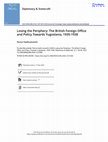Papers by Perica Hadzi-Jovancic

Politički život, 2022
The article follows the key propaganda battle between the pro-and anti-Scottish independence camp... more The article follows the key propaganda battle between the pro-and anti-Scottish independence camps in the three-year period before the Scottish independence referendum was held on 18 September 2014. By focusing on the narrative of the major pro-independence proponents, first of all Alex Salmond, at the time the First Minister of Scotland, the article points towards a changed shift in defining the reasons for independence-from a more traditional nationalistic rhetoric, towards insisting on a false dichotomy between Scotland and Westminster. At the same time, the article explains the major pitfall of the anti-independence propaganda, namely its negativity and insisting on fearmongering and warnings of possible economic hardships in case Scotland became independent. Eventually, it was the intervention of Gordon Brown, former British Labour Prime Minister from Scotland (2007-10), just days before the referendum, which crucially gave the anti-independence camp a fresh lease of energy, by reminding the Scots that there was nothing wrong in voting for the Union, as patriotism is not an exclusive domain of nationalists.

Dilpmacy & Statecraft, 2020
Between the 1935-1936 Abyssinian crisis and the 1938 Munich conference, Britain's interests in th... more Between the 1935-1936 Abyssinian crisis and the 1938 Munich conference, Britain's interests in the Balkans and its relationship with other Great Powers limited British policy towards Yugoslavia. This analysis points to a higher level of British influence in Belgrade in the mid-1930s than is usually recognised in the historiography and argues that by not responding adequately to security challenges in the Balkans after the withdrawal of French influence from the region, Britain contributed to a power-vacuum for Germany to fill. As the British position in Southeastern Europe weakened after summer 1936 due to advancing Italian and German penetration, Yugoslavia's importance grew in the eyes of Foreign Office officials. However, Britain's position in Belgrade eroded to such a degree by late 1938 that Yugoslavia was no longer willing or able to offer any assistance in the event of war. This examination provides a better understanding of Britain's interests in Southeastern Europe by highlighting the geo-strategic importance of Yugoslavia and the Balkans as a buffer zone to Central Europe and a flank of Britain's Mediterranean routes when the balance of power in the continent was disturbed to British disadvantage. Yugoslav policy has much more far reaching effects on developments all over Europe than her size and potential military strength appear to a superficial view to warrant. O'Malley, November 1936 1 Focussing on the Foreign Office and the role that key diplomats in Belgrade played between the 1935-1936 Abyssinian crisis and the 1938 Munich conference, this analysis assesses British understanding of Yugoslavia's geo-strategic position and their foreign policy in those crucial three years. As recently demonstrated, Britain was possibly the only Great Power before 1936 that considered a regional understanding as a stepping-stone to ultimate peace in the Balkans. 2 Therefore, it opposed regional alignments excluding or isolating certain countries, an attitude explaining British opposition to the Little Entente's
Godisnjak za drustvenu istoriju, 2017
This article focuses on German economic theory and plans for South-Eastern Europe in the 1930s an... more This article focuses on German economic theory and plans for South-Eastern Europe in the 1930s and Yugoslavia's responses to it. By highlighting the opposition of Yugoslav economic experts, business leaders, press and officials towards the concepts of Grosswirtschaftsraum and Ergänzungswirtschaft, the article emphasises conflicting directions of economic development between the two countries; this would sooner or later lead to the confrontation, despite the level of political cooperation between the two countries.
Book Reviews by Perica Hadzi-Jovancic

Tokovi istorije, 2017
Појам меке силе први је у друштвене и политичке науке крајем 80-их година 20. века увео Џозеф Нај... more Појам меке силе први је у друштвене и политичке науке крајем 80-их година 20. века увео Џозеф Нај (Joseph Nye). У чланку под називом "Soft Power", објављеном 1990. у часопису Foreign Policy, Нај истиче: "Доказ да је једна држава сила више не лежи у њеном финансијском и материјалном потенцијалу, већ у способности да мења понашање других држава". Концепт меке силе дакле стоји у опозицији са традиционалним схватањем које дефинише једну државу као велику силу само ако је способна да се наметне другим државама употребом војне силе, ратним освајањем и новцем. Случај Немачке након 1918. стога је јако захвалан и интересантан за проучавање у овом контексту. Убрзо након завршетка Првог светског рата, генерал Вилхелм Гренер песимистички је закључио: "Спољна политика се састоји од моћи, новца, војске и морнарице. Од свега овога, ми немамо више ништа". Али ово је било само део проблема и то онај део који је био јасно уочљив и савременицима и историчарима. Проблеми су били много комплекснији и у великој мери су занемаривани у досадашњој историографији. Наиме, и поред увреженог схватања да је спољна трговина, то јест економска експанзија једне извозно оријентисане привредне силе била једини сектор који је остао на располагању Немачкој за поновну изградњу свог статуса у европској политици, основа за спровођење било какве активне спољнотрговинске политике према иностранству је заправо била разорена ратом. Први светски рат није само довео до политичког раскола у односима побеђене Немачке са новонасталим државама источне и југоисточне Европе; рат је потпуно уништио трговачке и културне везе које су брижљиво грађене у деценијама пре 1914, а немачки престиж је п ретрпео велики ударац. Изградња порушених веза и поверења коришћењем трговинске и културне размене као средства за поновни успон Немачке на позицију доминантне силе на простору централне и југоисточне Европе тема је књиге Стивена Гроса, професора на Универзитету Њујорк и једног од стручњака млађе генерације из области економске историје. Предмет Гросовог истраживања су представници немачке меке силе, који су по природи ствари били незванични и од владе у Берлину углавном независни носиоци немачког

European History Quarterly, 2018
Dragan Bakić, Britain and Interwar Danubian Europe: Foreign Policy and Security Challenges, 1919-... more Dragan Bakić, Britain and Interwar Danubian Europe: Foreign Policy and Security Challenges, 1919-1936, Bloomsbury Academic: London, 2017 288 pp.; 24 b/w illus.; 9781474250085, £85.00 (hbk); 9781474250108, £84.99 (EPUB ebook) Reviewed by: Perica Hadži-Jovančić, Wolfson College, University of Cambridge, UK Bakic´'s book on British security challenges in the Danube region after the First World War is a welcome addition to an otherwise scant bibliography on British foreign policy in this part of Europe in the period before the Munich Conference. The author's motivation was to fill that void by an analysis of various mutually dependent regional aspects, which interlinked to form a diverse political landscape. The book belongs to a conventional genre of diplomatic monograph and describes in detail British observations, assessments and reactions to the political developments in this permanently turbulent area, which geographically roughly corresponded to the territory of the former Austro-Hungary.









Uploads
Papers by Perica Hadzi-Jovancic
Book Reviews by Perica Hadzi-Jovancic